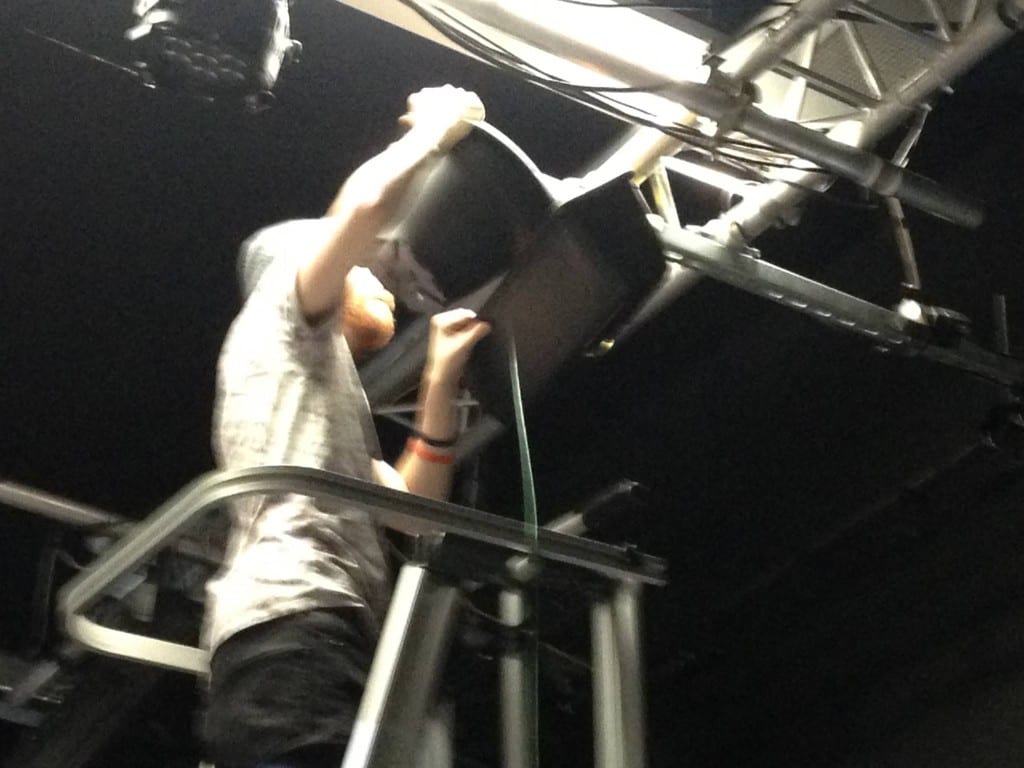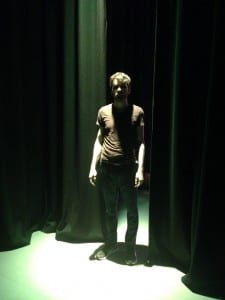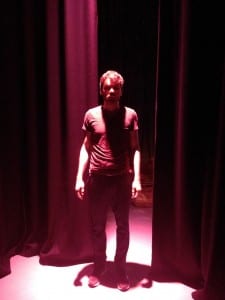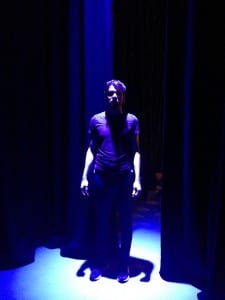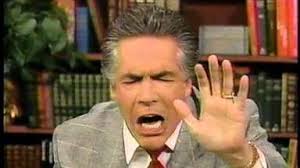As my performance has passed, and I am left only with my own ruminations on how it went, this blog post will likely be a longer one, reflecting on the experience of creating my show and how I believe the final piece turned out.
The beginning of my creative process felt as if I was starting within an artistic void. I had no idea what I wanted my final performance to achieve, and my preconceptions about what solo performance should be were simple; there can only be a single performer. This creative freedom excited me. However, I was also apprehensive about the need to explore and experiment with many possible ideas, as being without a generic categorisation left me open to a plethora of possible outcomes – which would have taken a long time to eliminate until I only had one left.
However, as shown in my early blogs, the inception of this performance occurred very early, through a writing exercise done in class. The piece then underwent many modifications, beginning with an unsubtle critique of consumerism, and ending in a show which had a variety of facets (one of which still being the critique of consumerism). Beginning with a poem was particularly valuable, as it later directed me towards other artistic influences, not just solo performers. This in turn led me to poetry concerned primarily with civilization’s decay, as well as the decline of spirituality, the environment, and art. It was due to this established poetic tradition, where the poet derides the current era while exalting the previous ones (seen particularly in the work of William Blake), that I decided to write the entire script in poems. Therefore, attempting to write my own poetry which, I feel, was relevant to the current social anxieties, became a central conceit of my performance. Subsequently, reading the work of poets from the last few centuries which held similar themes and concerns as my own, made me want to add new aspects to the piece – such as the idea of the poet being closest to nature and/or God, and a certain anxiety of influence which I felt for my own poems. However, I feel neither of these aspects were explored as deeply as I had originally planned, due to the direction the tone of my show took and the short running time. For example, I originally had plans to write a poem which paralleled one of Blake’s, but staging his within a divine light, and my own within the decrepit remnants of the performance space near the end of the piece, showing a sense of my own anxieties over my poetry compared to the work I have drawn from.
List of poets I explored:
William Blake
William Wordsworth
William Drummond of Hawthornden
Matthew Arnold
Samuel Taylor Coleridge
W. B. Yeats
T. S. Eliot
Ezra Pound
Allen Ginsberg
Charles Bukowski
As my performance developed it became clear it was not going to be a ‘confessional’ piece, where the performer reveals their most intimate thought and experiences. Conventionally, confessional pieces are lit in such a way that the audience and performer occupy the same area. As I became a preacher figure, I did not want to use this form of lighting, and instead kept a more traditional lighting plan. I wished to give myself the dominant position of power within the performance, so utilised spotlights to pull focus, as well as suggest divine light. The three coloured lights – blue, red, and a pale green (which transitioned into grey) – were intended to shift the atmosphere and implied location – from Heaven to Hell then finally Purgatory. The pale green transitioning to grey was intended as a post death device, where the green (suggesting both Blake’s Earth, and the chemical poisons now corrupting it) fades to grey (Purgatory). The idea to center the three chapters around this concept interested me greatly. However, I regret not exploring this further, as I believe it didn’t translate as intended, due perhaps to a somewhat perfunctory execution of the concept.
My piece began with Elgar’s Jerusalem, a hymn which originated as a poem by William Blake, setting the tone of societal and spiritual decline. I stood by a buffet style table covered in plates with Doritos and platic cups of wine – a reference to Holy Communion. As the audience entered I repeatedly said ‘help yourself’, a double meaning between the ‘holy’ buffet and salvation. replacing the wafer with Doritos implied the spiritual decay of society in favour of a junk food culture, as well as being irreverent towards religious traditions, which have simply become hollow platitudes in modern culture. There was a delay in the audience entering, which meant the two minutes and forty seconds of Jerusalem was not enough, so the other half (which was intended to play at the end) was also heard. However, despite this minor inconvenience, no major issues arose in this section.
A key concept of my performance was decay, and I believe this came across despite the lack of flag-posting this idea. The televangelist clips worked well between the poems, adding another dimension to the performance. My choice to gradually degrade the clips as the piece developed hopefully conveyed the sense of degeneration I was aiming for. The Dorito drop, although not as I originally imagined, also worked. The outline of my body left in the dust, and the angelic outline left when finished, looked good, particularly when lit and viewed through the heavenly perspective of the live-feed camera. Pulling the cord myself, although reminiscent of a scene from Flashdance (1983), did not mire the effect as much as I thought it may, perhaps instead giving a sense of self baptism which in turn leads to the degradation of the stage through the dust that remained. As decay was an original concept of the show, I wonder how the piece would have been affected if I furthered this by degenerating the stage further, possibly with torn or crumpled pages of Biblical verse and the poetry which had similar concerns as my own. However, overall I was happy with the staging decisions made, and the execution of them.

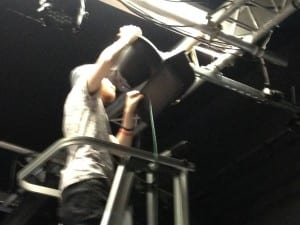 (The Dorito dust being placed in the drop trough)
(The Dorito dust being placed in the drop trough)
The delivery of my poems was an area which caused much deliberation. Originally there was little variation in my tone and style of delivery. This resulted in stagnant monologues, which was obviously unacceptable. Therefore, I decided to deliver the first poem as a preacher, who was near furious with the decline of religiosity. For the second poem there was a personality shift (caused by a ‘demonic’ possession), which had me deliver the lines in a more jovial style, enthusiastically impending end of the recognisable world, caused by the actions of humanity. Finally, when delivering the last poem, I spoke in numerous voices to break the singular voice into an equivocal cacophony, paralleling what Eliot does throughout The Wasteland (1922), and attempting to convey the message that the concerns of this performance have been present in the minds of a varied demographic.
The end of the piece came swiftly, with the final section of video being played whilst I created the Dorito angel in the dust. The final televangelist, Robert Tilton, says the words ‘the best, haha hahaha….’ and I rise to finish his sentence – ‘is yet to come’. The implication of possession infers that the greed and decay of the age is infectious, a certain pestilence plaguing Earth (also suggested in the line ‘Blake’s demonic shade takes shape’, a reference to Beelzebub – demonic prince of gluttony – whom Blake famously drew). Additionally, the gradual possession is seen earlier in the piece, where the lighting changes to red after a sudden shudder and change in personality of the performer. After I finished Tilton’s sentence I stood, and walked back over to the buffet table at the start of the piece, as if getting ready to give another “religious” service, despite the decline of the stage and the possession – implying a greed eventually bequeathed to evangelists by the culture they occupy.
Overall I was pleased with the performance, and enjoyed creating the piece. Both the time spent researching the poets and artists who influenced the piece, and creating the work was invaluable. However, it would be disingenuous to not recognise the support I was given for this module, so I would like to thank all those who contributed to the piece, particularly my tutor, whose suggestions and guidance made the process and piece far superior than it would have been otherwise. However, if I were to be truly critical of myself I would say that there was too much uncertainty in my decisions, such as whether to make a piece with an oppressive atmosphere or an isolated one (meaning that the lack of audience interaction may have reduced the impact of my performance). This uncertainty, I believe, limited the potential of the show. However, the lessons I have learnt from creating the work should contribute to any art I attempt to create in the future, and thus was an invaluable experience.
